April 2025 FloridAgriculture eNewsletter
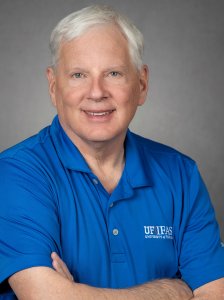 By J. Scott Angle
By J. Scott Angle
[email protected]
@IFAS_VP
Levy County Farm Bureau board member Aaron Lane is among the first to know about fertilizer innovations and how they work on his farm because of his partnership with UF/IFAS.
UF/IFAS scientists Mark Warren, Shivendra Kumar and Bob Hochmuth take what they see in the lab or on their research fields and test it on Lane’s farm to see if it works in the real world.
On Lane’s farm they’ve run trials on cool season forages, controlled release fertilizer for watermelon and Bermudagrass, forage herbicides, Bermudagrass variety establishment, and drip fertigation fertilizer uniformity.
The innovation that farmer and scientist pursue together keep farmers in business. And it’s key to reducing annual nitrogen use to help meet water quality goals for the Suwannee Valley.
Every year UF/IFAS and the Farm Bureau celebrate the gains we’re making toward that goal, one farm at a time, at Suwannee CARES, a celebration at the UF/IFAS North Florida Research and Education Center—Suwannee Valley (NFREC-SV). The event highlights producers for their unpaid environmental stewardship as they make a living feeding Florida and the nation.
Please join me, Warren, Lane and hundreds of your fellow Farm Bureau members on May 1 for this year’s Suwannee CARES event. Register here.
Lane is a past honoree. The trials have helped him stay profitable and served as a model for how other Suwannee Valley farmers can meet water quality goals. The on-farm trials can show where innovations result in savings for farmers, and where the costs aren’t worth it.
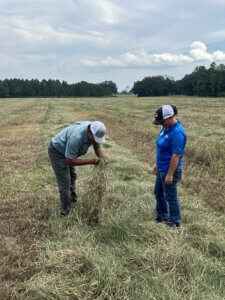 In the ongoing trial of controlled release fertilizer on hay at Lane’s farm, so far the costs aren’t worth it. Lane suspected as much beforehand. A season’s worth of data reaffirmed that. But it also set the stage for trying a lower-cost fertilizer to see if scientist and farmer can make it pencil out at harvest time.
In the ongoing trial of controlled release fertilizer on hay at Lane’s farm, so far the costs aren’t worth it. Lane suspected as much beforehand. A season’s worth of data reaffirmed that. But it also set the stage for trying a lower-cost fertilizer to see if scientist and farmer can make it pencil out at harvest time.
The reason Lane was even willing to explore this on 10 acres of his land was that he trusts Levy County Extension Director Warren. For six years Warren has given him answers to his questions instantly or said eight magic words that reaffirm his honesty and trustworthiness: “I don’t know, but I can find out.”
Warren doesn’t ask Lane to pay the costs of the field trial – Lane is already taking a risk with his land. Thanks to best management practices cost share and incentive programs from the Florida Department of Agriculture and Consumer Services and the Suwannee River Water Management District, the additional cost of the new fertilizer and the time and effort of the UF/IFAS scientific team is covered.
But for Lane, on-farm trials still mean giving scientists access to his land, allowing them to collect data that represents trade secrets, coordinating his operation so as not to interfere with the research, and risking a reduced yield. That’s a harder bargain to make with a scientist who’s a stranger.
Neither of us can do this alone. We need to be scientific partners. Warren and Lane exemplify the mutual trust on which that partnership is based.
J. Scott Angle is the University of Florida’s Senior Vice President for Agriculture and Natural Resources and leader of the UF Institute of Food and Agricultural Sciences (UF/IFAS).

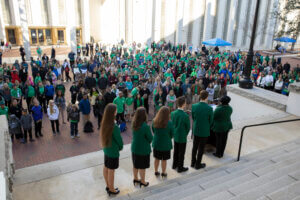
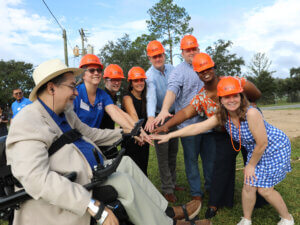
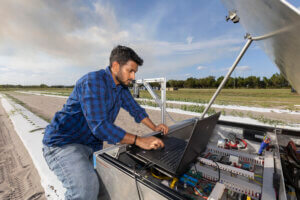
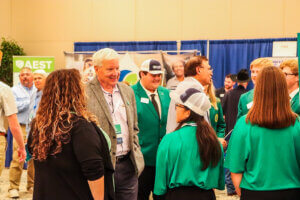 To Michael Dooner, agriculture is a way to protect the earth. As a forestry leader, your immediate past treasurer champions the benefits of agriculture to filter and produce abundant clean water and air, sequester carbon, and harbor wildlife. He wants to see producers recognized and compensated for what they contribute to society, not just what they produce.
To Michael Dooner, agriculture is a way to protect the earth. As a forestry leader, your immediate past treasurer champions the benefits of agriculture to filter and produce abundant clean water and air, sequester carbon, and harbor wildlife. He wants to see producers recognized and compensated for what they contribute to society, not just what they produce.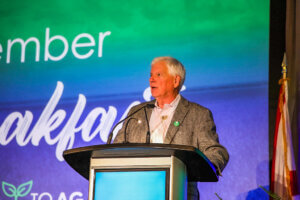 Together these conversations reminded me of what a jewel agriculture is. Each conversation was like turning that jewel ever so slightly and appreciating the glint of each facet.
Together these conversations reminded me of what a jewel agriculture is. Each conversation was like turning that jewel ever so slightly and appreciating the glint of each facet.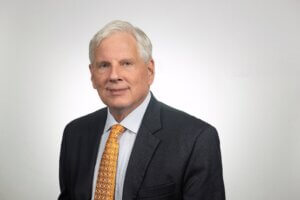
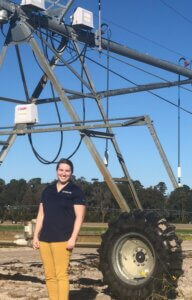 Court is th
Court is th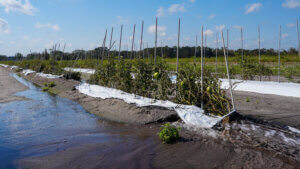 First, with every storm she builds bigger disaster-specific databases that will someday allow for accurate and rapid damage assessment without the need for surveys. No more filling out forms at moments when you’re hurting and need to be doing other things.
First, with every storm she builds bigger disaster-specific databases that will someday allow for accurate and rapid damage assessment without the need for surveys. No more filling out forms at moments when you’re hurting and need to be doing other things.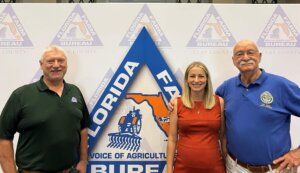
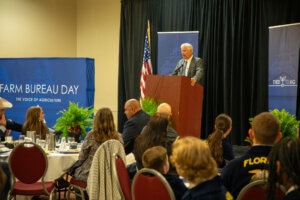 Part of the future was in the room. Scores of blue-jacketed
Part of the future was in the room. Scores of blue-jacketed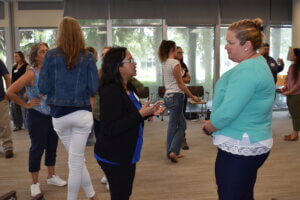 FFBF leadership programs coordinator
FFBF leadership programs coordinator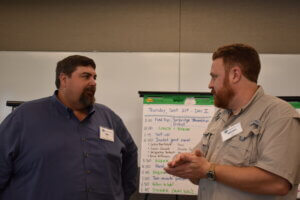
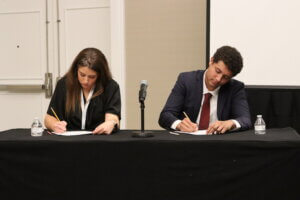 Heijkoop’s road to Orlando, where she competed in the Collegiate Discussion Meet, was guided by two important mentors—Staci Sims at FFBF and Dr. Charlotte Emerson at CALS.
Heijkoop’s road to Orlando, where she competed in the Collegiate Discussion Meet, was guided by two important mentors—Staci Sims at FFBF and Dr. Charlotte Emerson at CALS.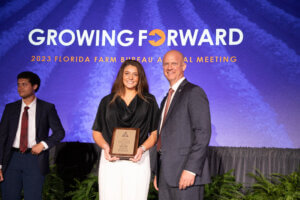 Heijkoop won the state Collegiate Discussion Meet. FFBF and UF/IFAS will support her in her journey next year to compete at the national level in the American Farm Bureau Federation Collegiate Discussion Meet. FFBF supports students through th
Heijkoop won the state Collegiate Discussion Meet. FFBF and UF/IFAS will support her in her journey next year to compete at the national level in the American Farm Bureau Federation Collegiate Discussion Meet. FFBF supports students through th